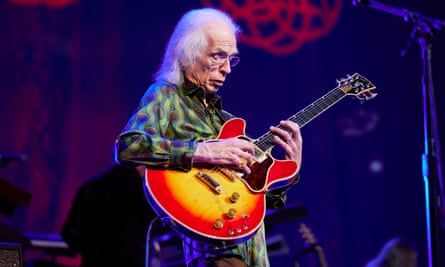Walking into Bridgewater Hall, you are greeted with a vast stretch of moons, stars, serpents, clouds and elaborate rock formations. The dreamlike fantasy landscapes of Yes’s record covers, designed by Roger Dean, make up an eye-popping gallery in the foyer. Since the band’s 1971 album, Fragile, Dean’s illustrations have been synonymous with the progressive rock outfit, with his bubble Yes logo covering the chests and backs of a huge percentage of the audience tonight.
As there are no founding members left in the band, Dean’s relationship with Yes stretches further back than any of the musicians on stage tonight, with the exception of guitarist Steve Howe. However, it’s immediately clear the band’s epic legacy is in the hands of careful custodians via Geoff Downes, Jon Davison, Billy Sherwood and Jay Schellen. From the opening Machine Messiah – a multi-headed beast that runs the gauntlet from metal-esque riffs to squealing guitar solo wig-outs to acoustic breakdowns and washes of choral-like keyboards – it sets the mood for an evening filled with sprawling, intricate, occasionally exhausting yet immaculately delivered music.

For a band with one of the punchiest names in the business, brevity has rarely been of interest to Yes and that remains the case. The seven-minute I’ve Seen All Good People feels relatively compact and contained, by their standards, as it shifts from a slow-burn acoustic chug into an almost glam-like stomper. While the sheer unrelenting length, density and complexity of Yes’s performance can feel overwhelming – even when they play slowly they play busily – and their pristine note-perfect renditions don’t leave much room for surprise, the band’s intuitive understanding of their own sonic world and the precision with which they are able to execute it remains impressive.
In their second set they condense their 80-minute 1973 album Tales from Topographic Oceans into a wildly adventurous 20-minute medley, before a powerhouse finish of Roundabout and Starship Trooper. It is a dizzying end to an evening already loaded with head-spinning intensity and, much like the otherworldly artwork that greeted you upon entry, the band leave you exiting in a similar state of sensory overload.
Source: theguardian.com


